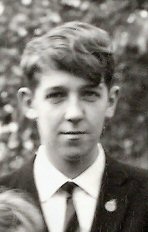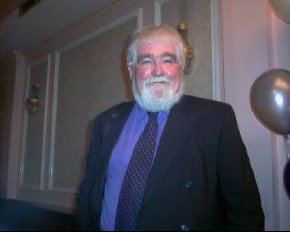Richard Brown 60 writes:
I had been involved in drama at the school since the first year and in the six years Bill Rennison was at the school he generally acted as stage-manager.
From small non-speaking parts, I graduated to speaking and then major roles. I played a Sicilian lord in The Winter’s Tale in December 1962; Bardolph, servant to Falstaff in The Merry Wives of Windsor part of The Memory Be Green in May 1964; in the pirate chorus of The Pirates of Penzance at Easter 1965 (the only occasion I had to wear tights); an apprentice in Thomas Dekker’s Shoemaker’s Holiday in 1966 for which I also did most of the background historical research used for stage construction and costume design; Antonio in The Merchant of Venice in 1967 and the Chorus in Antigone in 1968.
In addition, there was involvement in various in-school house productions. I remember playing a ballet dancer, complete with tutu in one memorable (or infamous) production of Swan Lake. The skills I developed through drama and through poetry readings have played an important part in my subsequent career. The ability to speak in public, to know the importance of the dramatic and the issue of audience and presence have all been invaluable in teaching. Learning how to hold an audience is important when you want to hold a class.
O Levels came and went following a course on modern British and European History, my first encounter with the Chartists, and into Advanced Level. Sixth form life at Soham was very relaxed and there was a lot of free time to discuss and debate the current political issues like the Vietnam War and the 1967 Arab-Israeli War as well as more parochial issues like the threat to the school from the comprehensive movement (something that led to the school disappearing in 1972).
After 1965, I increasingly became involved actively in politics and especially the anti-war movement. Partly encouraged by the Head, I went on marches and demonstrations, first in Cambridge and later in London. The Grosvenor Square demonstration particularly sticks in the mind.
Advanced Level was grounded in studying the sixteenth and seventeenth centuries in Britain and Europe with a special subject on the reign of Charles II. All the reading I’d done in the years before this paid off and I found an increasing pleasure in examining the complexities of the period. The focus may have been on the political and diplomatic, a characteristic of much school history at this time but, for the first time there was a detailed examination of the social, economic, cultural and ideological dimensions of the past.
This, combined with a heightened awareness of history as a discipline and as a set of ideas and methods made these three years a period of self-exploration and personal historical development. I especially enjoyed the depth study of Charles II and remember giving class papers on the personality of Charles II and the political development of the Cabal, the governing group from 1667 until 1672, both lasting over two hours each. The school library had copies of the relevant State Papers that proved an invaluable source of information and ideas.
The years in the sixth form saw an increasingly organisational role for me in the school. A prefect in 1965-1966, I was Head Boy in 1966-1967 and, in my third year in the sixth the leading student in the school (you could not be Head Boy for more than a year). All these roles meant that the Head expected you to take on a more active part in the organisation of the school especially in pupil discipline, an area left almost entirely to senior students.
If a teacher was having problems with pupils lower down the school, the Head expected the senior prefects to sort out the problem. One example of this will suffice. A new and rather young Geography teacher was having difficulties with a second year class and the Head asked the prefects to deal with this. The teacher was asked not to go to the lesson for the first ten minutes of the next lesson and the senior prefects, accompanied by the school’s First Eleven then went into the class and ‘instructed’ the pupils about correct behaviour. There were no further problems. The methods used would have been completely unacceptable today but, in the context of the mid-1960s were not only acceptable but encouraged.
What I would do beyond school was taken as read by the Head. My only careers interview, with Mr Tabraham, lasted about twenty seconds:
“You’re going to university.”
“Yes.”
“Which Cambridge college?”
“Emmanuel.”
“That’s fine”.
It was assumed I would be going to Oxbridge: I had spent a few days at Emmanuel at a History conference in the lower sixth and had enjoyed the college atmosphere. In those days, Cambridge entrance tended to occur after a third year in the sixth form after an entrance examination.
I had the interview with Peter Hunter-Blair, an Anglo-Saxon historian in the December of 1967. I already had an unconditional offer from Reading so there really was no pressure at all. The interview went well, at least to begin with, and then he began to ask questions about Cromwell. Though Cromwell was part of the syllabus, I had done little real work on him and tried to turn the questions on to Charles II.
After about five minutes, the interviewer suggested, quite rightly, that I wasn’t really addressing the questions. I agreed but added that I did not know much about Cromwell and was happier talking about Charles. He then asked what I saw the function of an interview as. My reply was that it was to show what I knew, not what I did not know, adding that this was significant. The interview continued. I wasn’t confident that I’d performed at my best and was prepared for rejection.
The following morning as I came up the school drive, the Head beckoned me to his study. This wasn’t unusual and I thought he might want to ask me how the interview went, which he did. Apparently, Emmanuel’s admission tutor had called the school to inform the Head that I had been offered an unconditional place but had commented that I had been rather rude in the interview. My conception of a free and frank discussion had gone too far, he told the Head. I was appalled and my liking for Emmanuel evaporated almost immediately and I told the Head that I intended to turn the offer down if that was their attitude to academic freedom!
I should sleep on it, the Head responded. Time did not alter my view and the following day I confirmed my earlier judgement to the Head.
He thought, probably rightly that I was being too sensitive (or pig-headed) but it is a decision that I have never regretted. Reading was, for me, at that time the right university to go to. Only later, did I return to Cambridge to do my M.Phil.
There followed two terms at school with no pressures and it was then that I really got the writing bug. Reading awaited and I was able to read and write with a freedom that I have rarely had since. I suppose I should have left school and got a job for six months or so but having time to write and do a bit of teaching to the sixth form was a far better preparation for what was to follow. In those months, I was able to prepare for university.
© Richard Brown 2010
About me: Born Littleport; Littleport County Primary 1954-1960; SGS 1960-1968; Reading University 1968-1972: BA (Hons), PGCE; Cambridge University 1985-1986: MPhil.
After teaching for three years at King Edward VI, Bury St Edmunds (1972-1975) I moved to Bedfordshire where I still remain. I spent ten years at an upper school in Houghton Regis as Head of History (1975-1985) before spending two years at Cambridge University on a national research project on teacher training and got an MPhil.
Between 1987 and 2006 when I took early retirement, I was at Manshead School in Dunstable as Head of History, Citizenship and Personal and Social Education (1991-2006) and as Marketing Director (1997-2006).
In the last twenty years I have written eighteen books: the most recent, Three Rebellions on political unrest in Canada, South Wales and Australia in the mid-ninteenth century, was published in January 2010.
I am now working on two sequels both of which are near
completion:
Three Rebellions: Famine, Fenians and Freedom 1840-1882,
a study of Irish nationalism in the British Empire again
focusing on Canada and Australia and
Rebellion in the British Empire: Slaves, convicts, native
peoples and settlers and liberty.
They will be published in 2012 and 2013 respectively.
Once this project is completed I intend to write The Global History of Chartism, an examination of the impact of ideas on global political structures, development and ideology.
I manage the History Zone blog.
 1965 SGS School Photo |
 |
page created 23 Aug 10